Posts by Dr. Karen Finn
How To Get Over An Unfair Divorce
When you stop feeling victimized and start feeling happy, you’ll be able to move on with your life.
No matter how you look at it, all divorces are unfair.
Is it fair that you’ve devoted x number of years to trying to make your marriage work only to wind up divorced? No.
Is it fair that you’re now paying child support instead of living with your children? Absolutely not.
Is it fair that s/he has already moved on with their life and you’re still in so much pain? No way in H#LL!
There’s nothing fair about divorce. But there’s a problem living with nearly constant thoughts of how unfair your divorce is. You will remain bitter, resentful and unhappy.
And when you remain in these emotions, you’ll be nearly unrecognizable to yourself and those you love. You won’t be the same fun, positive, energetic person you were before all of this happened.
Just in case you’re wondering if how you’re dealing with the unfairness of your divorce is really all that bad, here are some of the tell-tale signs that you’re focusing too much on the unfairness:
- Complaining to anyone who will listen about how unjust things are.
- Talking about your ex or the court or whomever you blame for the unfairness and who you view as responsible for destroying your life
- Allowing yourself to focus on the past and continue to fume about the injustice of it all
The solution for finding yourself and your happiness again is to use the emotions you feel when you think about the iniquity of your divorce as the fuel you need to begin taking constructive action that will build your future and move you forward.
Here is one strategy you can use to get over an unfair divorce:
- Quickly list all the things that are unfair about your divorce.
Doing this quickly is key here. You want to touch on the unfairness, but you don’t want to get sucked into dwelling on it.To help you get started, here are a few of the unfair things my clients have dealt with.
S/he hid a lot of money when they were planning to divorce me. And now they’re living the easy life and I’m stuck scrounging for every penny!
S/he won’t actively participate in co-parenting. They’re waiting for me to make every decision and then complaining about the decisions I make!
S/he is still trying to control me. They’re threatening to take the children from me unless I agree to what they want.
- Identify which emotions you would rather have right now.
Hopefully this step is fairly easy for you and the emotions you would rather have center around feeling happy again. - Quickly list all the things that you are happy about.No matter how unfair things are with your divorce, you can find things to be genuinely happy about. Maybe it’s that you’re healthy, or that your kids are amazing, or that you’re not married to your ex anymore.
- Now look at each of the items on your list from step 1 and ask yourself “What’s one thing I can do about this item to move me forward?”It can be difficult to come up with action steps when you’re mired in the iniquity of the situation. So, here are some examples of things you might consider doing.Call your attorney. Just remember that if you choose to do this that there will be a cost in doing so, so be clear that calling your attorney will be worth the cost.
Decide you want to increase your income and figure out what you need to do to make that happen. Maybe you need to take a second job or start a side gig. Maybe you can go back to school. Maybe you can ask your boss for a raise.
Spend time every day being grateful for what you do have. Sometimes shifting your focus to the positive can make all the difference in your outlook.
Establish and communicate the boundaries needed with your ex. This is important if you’re feeling manipulated or controlled by your ex. (Here’s an article to help you get started.)
- Get into action to take your life back
Begin working on at least one of the ideas you came up with from the previous step. The longer you remain focused on how unfair things are, the longer you’re letting your ex continue to control you and the longer it will take you to get over your unfair divorce. You’ll be spending the majority of your time and energy focused on what has already happened instead of using it to live your life.
In some ways it feels really good to know that it’s not your fault that things are the way they are for you now and to vilify the one(s) responsible. However, if you’re not doing anything to move yourself forward from the unfairness and victimhood, then that is your fault.
And the beautiful thing about being able to take some responsibility for moving yourself forward from where you are now is that you will start to feel better and much less bitter.
I’m Dr. Karen Finn, a divorce and personal life coach. I help people navigate all the challenges of divorce. You can join my newsletter list for free weekly advice. And, if you’re ready, you can take the first step toward working with me as your personal coach by scheduling a private consultation.
Looking for more information about getting over your divorce? You’ll find what you’re looking for in Healing After Divorce.
What To Do If You’re Bored And Unhappy With Marriage
You don’t have to settle for feeling bored and unhappy with marriage. Things can be better.
Many people simply accept being bored and unhappy with marriage as normal. They believe you can’t feel the elation and attraction you felt when your love was new forever.
However, there’s a huge gap between the feelings of being in love you had when your relationship was new and feeling bored and unhappy.
Choosing to settle for feeling meh about your marriage is not only extremely sad, but it can negatively impact your health. Do you really want to accept this as your fate? Probably not.
Just because you know you’re tired of feeling bored and unhappy with marriage, doesn’t mean you know what to do about it. So, it’s time to consider your options.
One option you have is divorce. Yet if the only problem in your marriage is that it’s in a rut and it’s lost its spark, divorce is an extreme response.
Another option you can consider is continuing to feel bored and unhappy with your marriage. If you were truly willing to settle for this type of marriage, you wouldn’t be reading this article.
The final option to consider is bringing life back to your marriage. This may initially seem an impossible task. But if you and your spouse still love each other, reviving your marriage is the best course you can take.
Reviving your marriage really isn’t as hard as you might think because boredom can be fixed – if you’re willing to break out of your marital rut.
Just about everyone likes new ideas, or new experiences, or new things. And knowing this is one of the keys to making your unhappy marriage happy again.
There are several ways you can use the idea of newness to begin feeling less bored and unhappy with your marriage.
You might plan adventures the two of you can look forward to. The size of the adventure doesn’t matter. You might be thrilled with simply going someplace new for dinner. You might decide to plan an exotic vacation together. The idea here is for you both to feel excited about doing something together.
You might decide to learn something new together. Some couples really enjoy exploring gardening, ballroom dancing, robotics, skiing, kayaking, and bird watching. If none of these inspire you, that’s OK because they’re just meant to open your thoughts up to what will be fun for the two of you.
Reviving old dreams you shared, but shelved, is another way to inject some newness into your marriage. Even if you can’t make you dreams come true right away, dusting them off and beginning to plan and work toward making them a reality will definitely get the two of you thinking about and doing more exciting (aka less boring) things together.
Your marriage may have become boring and unhappy because you’ve both stopped connecting the way you did when you were completed enamored with each other. Back then, you used to share just about everything that was going on with your lives.
Choosing to be vulnerable again and sharing the thoughts you’ve stopped discussing with your spouse is another way you can bring the spark back to your marriage.
When you look at these suggestions to take the boredom out of your marriage, you may not feel a lot of excitement about any of them. That’s OK.
The goal isn’t necessarily for you to have an exact roadmap to follow that will drag your marriage out of the rut it’s fallen into. The real goal is for you to start thinking about how you can begin the work to stop feeling bored and unhappy with marriage.
After all, any marriage will become boring and can cause unhappiness when it is predictable. So choosing to shake things up, even if only in little ways to start, will help you to reignite the spark of love you each still have.
I’m Dr. Karen Finn, a divorce and personal life coach. I help people who want support in deciding what to do about their unhappy marriage. You can join my newsletter list for free weekly advice. And, if you’re ready, you can take the first step toward working with me as your personal coach by scheduling a private consultation.
Looking for more information about dealing with feeling bored and unhappy with marriage? You’ll find what you’re looking for in Unhappy Marriage.
15 Surviving Infidelity Quotes To Help You Heal
Whether you were betrayed, or you cheated, these surviving infidelity quotes can help you move past the pain.
Dealing with betrayal is very difficult because it triggers an avalanche of emotions for both of you.
If you cheated, chances are you’re wracked with guilt and confusion, yet yearning for your spouse’s forgiveness and love.
If you were betrayed, chances are you’re struggling with feeling insecure, unloved, and unwanted. You’re probably also wondering if you can ever truly trust your spouse again.
Whichever side of the infidelity you’re on, your emotions are running rampant because you and your marriage are facing a huge challenge – how to move forward. This is one of the most painful and confusing situations you’ll ever face.
In fact, sometimes the pain is so great that you can feel isolated and lost in it.
These 15 surviving infidelity quotes will help you find your way back from the fog of your confusion and pain, so you can move forward instead of remaining mired in the repercussions of the affair.
Sometimes your heart needs more time to accept what your mind already knows.
~Unknown~
When a marriage is rocked by infidelity, both partners suffer. You’ll both feel a distinct difference between the logical facts of your situation and the emotions of it. Take the time to communicate with your spouse to start getting your heads and hearts back in alignment before making any big decisions.

Feelings are much like waves, we can’t stop them from coming, but we can choose which ones to surf.
~Jonatan Mårtensson~
Dealing with grief is normal after an affair comes to light. Feeling fearful of the gigantic emotions of grief is fairly typical. Yet, if you can remember that after acknowledging your feelings, you can choose whether to stay in them at the moment they appear or let them pass, you’ll find your way through your grief about what the infidelity means to you a bit more easily.
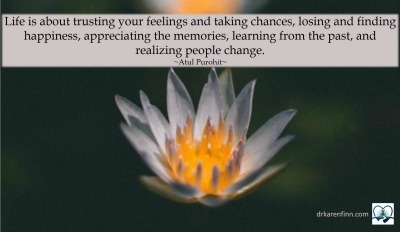
Life is about trusting your feelings and taking chances, losing and finding happiness, appreciating the memories, learning from the past, and realizing people change.
~Atul Purohit~
Accepting and making sense of what’s happened is critical to you being able to survive infidelity. The infidelity doesn’t negate the good times you’ve had together or the love you felt and shared. It just means that things are different now.
It might mean that your love for each other can grow and change to encompass the fact that an affair occurred. Or it might mean that your love can’t.
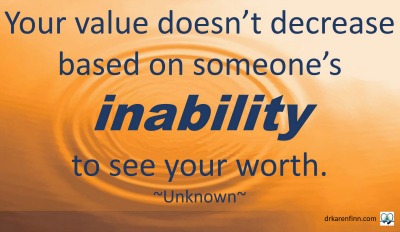
Your value doesn’t decrease based on someone’s inability to see your worth.
~Unknown~
Your self-esteem takes a beating when your spouse betrays you. It’s your belief that his/her actions are a direct reflection of who you are to your spouse that causes you so much pain. However, when you can remember that their actions are their own, then you can begin to reclaim your true value.
And if you’re the one who strayed, you may have cheated because you didn’t feel important to your spouse. You may have been searching for your value in the arms of another, instead of knowing your worth and talking with your spouse about your needs for connection with him/her.

On particularly rough days when I’m sure I can’t possibly endure, I like to remind myself that my track record for getting through bad days so far is 100% … and that’s pretty good.
~Unknown~
You have always made it through your worst days before. You can find a way to survive infidelity too by just taking it one breath at a time.

You never know how strong you are until being strong is the only choice you have.
~Unknown~
You can conquer anything you choose to. The challenge of an affair is just another life experience that you can overcome by choosing to let healing from it bring out the best in you despite how weak, hopeless, and alone you may feel right now.
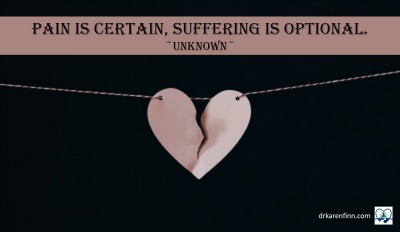
Pain is certain, suffering is optional.
~Unknown~
There’s no denying the excruciating pain of infidelity on the betrayed spouse. Yet, for straying spouses who want to heal and maintain their marriages, there’s also great pain.
However, you can choose how you will let the pain exist in your life. You can choose to let it take control and color the rest of your life in hurt. Or you can choose to experience the pain and do the work necessary to heal so the affair doesn’t haunt you for the rest of your life.

Infidelity is mentally, emotionally, and physically painful to the betrayed spouse. Be gentle with yourself as you heal.
~Dr. Karen Finn~
Because infidelity to so difficult and truly exhausting for a betrayed spouse to process, you must take care of yourself mentally, emotionally, and physically. This will include allowing yourself to grieve without wallowing, to get enough sleep, to eat healthy meals, to get enough exercise, and maybe even work with a helping professional to process the pain.
Dealing with the aftermath of infidelity is also exhausting for a straying spouse who wants to save their marriage. In addition to taking full responsibility for your choice of being unfaithful, you must also take good care of yourself because your other responsibility is to be there for your spouse.

You come to love not by finding the perfect person, but by seeing an imperfect person perfectly.
~Sam Keen~
No one is perfect – no matter how you viewed each other on your wedding day. Sometimes, by learning to continually accept and even forgive your spouse’s imperfections you can develop greater compassion and love.

Healing doesn’t mean the damage never existed. It means the damage no longer controls our lives.
~Unknown~
This is the essence of what putting the past behind you is all about. When you are completely healed from the infidelity, it will just be a part of your history instead of overshadowing every facet of your life.

Forget enough to get over it. Remember enough so it doesn’t happen again.
~Unknown~
Surviving infidelity doesn’t mean that you forgive and completely forget. It means that you do forgive, and you remember how you got to the place that the betrayal happened and then work to make sure you’re never in that place again.
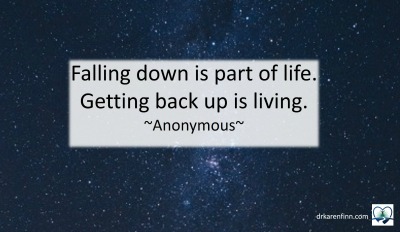
Falling down is part of life. Getting back up is living.
~Unknown~
You both have a part to play in the infidelity that has occurred. That may be shocking news to you if you’re the spouse who was betrayed, but it’s true.
Infidelity is an indication that there’s something wrong with the marriage. And if there’s a problem with a marriage both spouses are responsible.
The truth of this quote is that everyone makes mistakes. And you need to learn from your mistakes so you can continue living your life instead of getting stuck in feeling the grief, guilt, and shame of them.
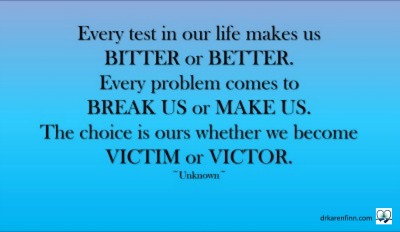
Every test in our life makes us bitter or better. Every problem come to break us or make us. The choice is ours whether we become victim or victor.
~Unknown~
This beautiful quote is a reminder of the choice you have. The power of choice is the greatest power you possess because it will determine the outcome and quality of your life.

A bird sitting on a tree is never afraid of the branch breaking because her trust is not on the branch but on her own wings.
~Unknown~
When a spouse chooses to be unfaithful, they rock their marriage to the core if not break it entirely.
Whether you were unfaithful, or your spouse was, the infidelity will offer you each the opportunity to become stronger individually and maybe heal your relationship.
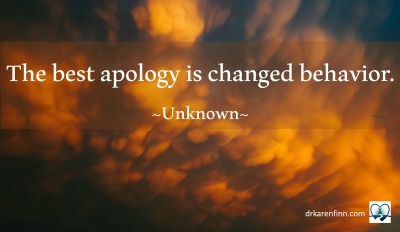
The best apology is changed behavior.
~Unknown~
You might assume that this quote only applies to the straying spouse. It absolutely does apply to them, but it also applies to the betrayed (unless abuse was/is part of the betrayal dynamic).
You see, your marriage was broken and you both have a part to play in it breaking. Changed behavior is the only way each of you will truly be able to apologize to each other and to yourselves for what has happened.
These 15 surviving infidelity quotes are just a springboard for your healing and finding your way back from the fog of confusion and pain. Hopefully, you’ve found a quote or two that really speaks to you and gives you a sense of comfort, a renewed sense of determination, or simply hope that you will get through this and feel better.
I’m Dr. Karen Finn, a divorce and personal life coach who helps people just like you who want support in dealing with the pain of infidelity. You can join my newsletter list for free weekly advice. If you’re interested in taking the first step toward working with me, you can schedule an introductory private coaching session.
Looking for more information about dealing with unfaithfulness? You’ll find what you’re looking for in Surviving Infidelity.
How To Get Through Grief After A Divorce
Healing from your divorce will teach you a lot about yourself – if you’re willing to learn.
It doesn’t matter which side of the divorce decision you’re on or the reason for the decision. The end of a marriage that began with dreams of happily ever after is heartbreaking.
It’s OK to experience grief after a divorce.
Grief after a divorce is profound because the end of your marriage means your entire life must change – whether you want it to or not.
Grief is also incredibly confusing. One minute you’re feeling hopeful about making a new life for yourself. And the next you’re crushed by the fact that your old way of living is over for good.
Of course, you’re also faced with uncertainty about how you’ll cope with creating new rituals and routines, so your life (and the lives of your children) can run smoothly.
You’re shouldering expanded responsibilities now that you’re on your own. And even having to learn how to do new things so your life can move forward in some fashion instead of simply falling apart.
Divorce means that your relationships change too – all of them. Obviously, your relationship with your former spouse changes. But so do your relationships with your children, your former in-laws, your extended family and even your friends.
All of this forced change is exhausting, overwhelming and extremely depressing.
Yet all of this confusion and upset is a normal part of grief after a divorce.
What is grief after a divorce really like?
At its core, grief is a process of transformation. It’s about accepting the full depth and breadth of all that comes with getting divorced. As you come to terms with what’s happened, you can work through the pain to make space for healing. This sets the stage for you to be able to create a new life for yourself.
And the strange thing is that you must want to create a new future for yourself in order to heal.
This seeming back and forth of the transformation brought about by grief is pretty typical. That’s because grief is a nonlinear process.
To make things a bit more complicated, grief is also unique for everyone and every situation. Even if you’ve grieved before or been divorced before, the grief you experience this time will be different. So, no one can tell you how long it will take you to heal from your divorce.
However, that doesn’t mean there aren’t signs you can watch for to know you’re making progress in your transformation.
It’s fairly common to experience six different types of emotions as you heal from grief after divorce.
- Shock and denial are powerful emotions that keep you from experiencing too much pain at once. Most associate them with the initial phases of divorce. However, it’s common to experience both shock and denial when you face any unpleasant or unwanted task or realization throughout your healing journey.
- Pain and fear are other feelings associated with a desire to cling to the past and a reluctance to move forward into the new and unknown life waiting for you.The interesting thing about these feelings is that you can use them as motivation. You can use your pain to motivate you toward healthy ways of feeling better. And you can use your fear to help you make plans and take steps that reduce the risk of your fears becoming reality.
- In all likelihood, you’ll experience some type of anger as you heal from your divorce. You may find yourself filled with rage about the situation you’re in. You may be frustrated with yourself for the part you played in the end of your marriage. You may be flat out angry at your ex for not being the person you want them to be.The great thing about anger is that it’s an energizing emotion. You can use your increased vigor to productively move your life forward. You might even use your anger energy to begin a new exercise routine or go back to school. The possibilities are endless.
- Guilt is another highly uncomfortable emotion you may experience during your divorce journey. It’s common to feel guilty for what you did or didn’t do as a way of attempting to make sense of your divorce.On the one hand having some guilt about your part in the end of your marriage is good. It means that you’re starting to take responsibility for what has happened instead of feeling like a victim.Taking responsibility for your own actions is empowering. However, taking responsibility for your ex’s actions is detrimental. This is the challenge of experiencing guilt. You must maintain awareness of what is your stuff and what isn’t.For the stuff that’s yours, you must forgive yourself and, if appropriate, make amends before absorbing the lesson from your poor behavior and moving on with your life.
- Experiencing situational depression is also common when you’re grieving the end of your marriage. This just means that the funk you’re in isn’t chronic. It’s due to your divorce. As you continue your journey toward healing, you’ll feel less sad and listless and more like yourself again.However, if your depression feels too intense or uncomfortable, immediately consult with your doctor.
- Throughout your journey, you’ll begin noticing moments when your divorce and the changes you’re dealing with aren’t such a big deal. Things will feel alright. Definitely different, but alright. This is how you know you’re putting bits of your grief behind you.
This list of six common emotions of grief after a divorce can be misleading.
It can seem like you’ll move from one emotion to the next and be done with your grief.
The truth is grief after divorce is tumultuous. Your emotions will twist and turn. Many people describe the experience as an emotional rollercoaster.
You won’t feel like yourself. You will yearn to feel “normal” again. You may even wonder if you’re still sane because of all the unfamiliar emotions and thoughts you’re having.
And all of this is the grief experience. It’s a lot to go through. And unfortunately, some people do get stuck in grief after a divorce.
However, that’s not how it has to be for you. You can fully complete your journey through grief and on to living a good life again.
Prepare for your grief work.
The first thing you must do is search for the best resources for you to help get through everything you’re facing.
You might consider reading books and blog posts, checking out quotes, movies and music to help you not only grapple with your grief, but inspire you to move forward.
You’ll also want to build a strong support network. One that’s filled with people who love you, can tell you the truth, and be there for you however long it takes for you to reclaim your life. Often the best people to do this are those who have themselves successfully healed from grief after a divorce.
Joining a divorce support group is a great way to find the support and community you need. The people in these groups are all on the same journey of wanting to heal from grief after a divorce. The camaraderie in these groups can help ease the intense feelings of loneliness and isolation that commonly accompany divorce.
Journaling is another great tool you can use to process your thoughts and feelings as you find your way back to feeling “normal” again. Scientific evidence shows that journaling provides benefits like helping you clarify your thoughts and feelings, reducing stress, solving problems more efficiently, and resolving disagreements.
How to process your grief.
After you have identified the first of your supportive resources, you’re prepared to begin working through your grief.
Knowing what grief is doesn’t really prep you for the up close and personal experience you’re having with it now. So, it’s important that you allow yourself to grieve without judgment. Judging your experience will just prolong your grief.
Instead, take the time to identify and acknowledge how you’re feeling even if your emotions and thoughts are rapidly changing. It’s by acknowledging what you’re going through that allows you to process it.
If you choose to instead ignore your thoughts and feelings, they’ll fester. They’ll also continue appearing – sometimes at inopportune or inappropriate times – until you deal with them.
As uncomfortable and unfamiliar as your thoughts and feelings are, it’s OK to have them.
Your brain is a problem-solving machine. And it’s trying to solve one of the biggest problems you’ve ever faced – grief after a divorce.
Because it’s trying so hard (and you’re probably not sleeping as well as you’d like), it’s throwing out every possible idea to help you feel better. And, frankly, some of the ideas are just horrible.
Then there’s an interesting connection between emotions and thoughts. It’s often a question of which came first an emotion or a thought.
So, as you’re going through your grief and not feeling like yourself, you’ll have strange thoughts. And as you have strange thoughts, you’ll have strange emotions.
With all of this going on, you’ll find that you may not be able to do things that used to come easily to you. It’s exhausting mentally, physically, and emotionally to grieve. Judging your diminished capacity as you grieve will only trap you deeper in your pain.
Instead, allow yourself to express what you’re feeling. Cry. Rant. Howl. It’s OK to let it out. In fact, it’s therapeutic.
And if you’re concerned that you might get lost in uncontrollable grief, set yourself a timer. And know that when the timer sounds, you can blow your nose, wipe the remnants of your tears, and pack up what’s left of your grief until the next time you choose to express it.
But as you continue to rely on the resources you’ve gathered, the strangeness of your thoughts and emotions will subside. You’ll begin to feel more like you again.
You must also set the intention of wanting to feel better and move on. Setting an intention like this will help you to stay focused on moving toward acceptance and creating the life you want. It will also make it less likely you’ll get stuck in negative, destructive, or painful emotions.
The intention you set initially might be small, like I just want to get through this afternoon without crying. As you achieve each of your intentions, continue setting them to be a bit more ambitious. And soon you’ll begin hoping and dreaming of all the wonderful things you want to experience and have again.
As long as you’re breathing, there’s still hope.
~Carolee Dean~
This is when you can truly begin planning for and creating a new, fulfilling life for yourself.
Because grief is so exhausting, it will leave you physically and psychologically vulnerable.
So, you must take very good care of yourself to most easily weather your journey of healing.
Physically, dealing with grief after a divorce is much like dealing with an illness like walking pneumonia. You’ll want to get plenty of rest, decrease unnecessary stress, drink plenty of water, eat healthy meals, and even decrease your workload if possible.
You’ll also want to nurture yourself daily by doing things that calm and soothe you. Consider spending time outside in nature, listening to music, meditation, getting a massage, watching your favorite movie, or reading your favorite book.
When you feel up to it, you’ll want to start exercising. Exercising, even going for a walk, can help you start dissipating troubling emotions like anger and sadness.
Learning how to truly care for yourself physically is one of the best lessons you can learn from your divorce.
Grieving takes time, so the gentler you are with yourself while you’re recovering, the easier time you’ll have getting through it. However, that doesn’t mean you should cloister yourself. You’re not contagious.
To help yourself recharge, spend as much face-to-face time as you can with those people who will go the distance with you, who support, energize and value you without judgment, criticism or directives. In other words, use your support group and reach out to a therapist or coach for extra help if you need it.
Pay attention to what you need. And speak up to express your needs even if others (including your friends or your ex) want something different. This is important because it’s a way to honor yourself and become more empowered.
Oftentimes, paying attention to what you need means saying “no” to someone else. You might find denying someone what they’re requesting of you an uncomfortable or guilt-ridden experience. But, if doing what they request isn’t in alignment with what you need and you’re not just being difficult, then you must say “no” to honor yourself.
As you heal more and more from your grief, you’ll want to broaden your social circle and begin building new friendships. Some of the ways you can find interesting people are by joining divorce support groups, networking groups, or Meetup groups. Taking a class, getting involved in your community and volunteering are other great opportunities for meeting people with similar interests.
You can also help yourself to psychologically get through your grief by developing a daily routine. The sooner you can develop a sense of structure and normalcy, the more comfortable your life will seem because you’ll have stopped at least some of the turmoil your divorce has created.
With the bolstering effect of the external support, you’ll be more effective at doing the internal work of healing from grief after a divorce. And this internal work is best done by being willing to learn and grow from your experience.
How to learn and grow from your divorce experience.
The hardest part of grief is coming to terms with the part you played in the end of your marriage. But when you do, you’ll have learned from your mistakes and be less likely to repeat them in the future. And it’s through this learning and growth that you’ll be able to confidently move on to the next phase of your life.
HelpGuide.org suggests asking yourself these questions to help you understand how the choices you made impacted your marriage:
- Step back and look at the big picture. How did you contribute to the problems of your marriage?
- Do you tend to repeat the same mistakes?
- Think about how you react to stress and deal with conflict and insecurities. Could you act in a more constructive way?
- Consider whether or not you accept other people the way they are, not the way they could or “should” be.
- Examine your negative feelings as a starting point for change. Are you in charge of your feelings, or are they in charge of you?
Whatever your answers are to these questions, be willing to forgive yourself for your part in the end of your marriage. You can’t change the past. You can only learn from it.
Don’t get stuck in your grief.
Even though you take care of yourself physically and psychologically as you’re dealing with your grief, you can still get stuck along the way. Some of the most common ways people derail their healing after divorce are:
- Rationalizing their grief away by saying/thinking things like “I wanted it” or “S/he cheated”
- Pretending they’re OK, when they’re not
- Wallowing in self-pity
- Replacing the lost relationship with a new one to avoid the pain
- Making major decisions that aren’t legally required before they are less emotional and can think clearly
- Using alcohol, food, drugs and/or sex to cope
- Believing that the time they were married was wasted
- Going through their grief alone
The truth is healing from grief after a divorce is a process. It can’t be hurried or side-stepped.
Your grief will take as long as you need it to take. No one can tell you how long that will be, but you can certainly help yourself to get through it as thoroughly and completely as possible by following these recommendations.
You owe it to yourself to heal your broken heart and the only way to completely heal it is to work through your grief, and discover a new happily ever after for yourself regardless of whether you ever marry again.
I’m Dr. Karen Finn, a divorce and personal life coach who helps people just like you who want support in healing from divorce. You can join my newsletter list for free weekly advice. And if you’re interested in taking the first step toward working with me, you can schedule an introductory private coaching session.
Looking for more information about dealing with all the losses of your divorce? You’ll find what you’re looking for in Dealing With Grief.
How Infidelity Can Save A Marriage (Yes, It’s Possible!)
Are you both open-minded and determined enough to consider this path instead?
Cheating isn’t always a death sentence for a marriage. In many cases, cheating is a catalyst for strengthening a marital relationship.
If you’re interested in learning how infidelity can save a marriage, you’re going to have to have an open-mind and be willing to make your own rules for your life despite what society may say is appropriate behavior.
Going against the norm isn’t easy, but when you make choices that reflect the true you the rewards are always greater self-respect and satisfaction with your life.
But, and this is VERY important, the only way you can have a chance of saving your marriage after an affair is if the straying spouse is genuinely remorseful AND the betrayed is willing to forgive. If either of you is unwilling to do your part, then there’s no hope for your marriage.
When the straying spouse does have genuine remorse and the betrayed spouse is willing to forgive, you can begin exploring the possibility of saving your marriage.
And the exploration begins with a broadening of perspective. Infidelity is betrayal without a doubt. It is also a wakeup call to the fact that it’s time to deal with your marital problems. If both of you can broaden your view of the betrayal in this way and are committed to putting in the hard work, then your marriage can be saved.
Trust must be rebuilt if your marriage is to make it.
To that end, the straying spouse must come clean – 100% clean – about what happened and be willing to gain his/her spouse’s trust. The importance of this can’t be emphasized enough. If s/he doesn’t tell all because s/he doesn’t want to hurt his/her spouse any more then s/he has already, s/he is continuing to lie. And lies destroy trust.
The betrayed spouse must be willing to trust his/her spouse. That doesn’t mean blindly. S/he has a definite right to ask for visibility into his/her spouse’s activities while trust is being rebuilt. And at some point, if the marriage is to survive, s/he must allow that his/her spouse is trustworthy.
Some sense of trust is required for each of you to feel safe. It’s from a feeling of safety that you both will be able to begin sharing your deepest thoughts and feelings about the issues in your marriage.
It’s also from a place of safety that you will each be able to honestly acknowledge your individual part in allowing your relationship to deteriorate to where it is today. And once you can each acknowledge your individual culpability to the other (without blame on either part), you can earnestly begin the next phase of your efforts to save your marriage.
This phase is when you really begin to understand how infidelity can save a marriage and what you each need to do.
You must both continue giving and being deserving of trust.
Trust is the bedrock of every successful marriage. That’s why it’s restoration is so important. Trust is what allows each of you to feel safe being together and know that your efforts to create a better marriage are worthwhile.
You must both be committed to growth.
Coasting along or accepting the status quo in your relationship is how you got to the point where one of you strayed. Making and keeping a good marriage requires effort.
If you are both committed to growth, you can create your better and happier marriage. It’s with a willingness to grow and become better spouses for each other that your marriage will become what you both believed it could be when you married.
You must both continue to give to and receive love from your spouse.
Love is more than just telling each other, “I love you.” Love is about taking action and expressing your love in a way your spouse can easily accept and understand.
You must both continue to communicate in respectful, compassionate, open and honest ways.
Not talking about the problems in your marriage is what got you to this point. Rebuilding the trust between you can only be done by learning how to converse together in respectful, open and honest ways. Communicating like this must become your norm instead of just what happens when you hit a crisis.
As you can tell, this phase never really ends if you want to have a great marriage.
But you’ll only reach this point with each other if you both choose to be open-minded about what the betrayal really means to your marriage (despite what society may think) and carefully consider how infidelity might actually be the catalyst that saves your marriage instead of destroys it.
I’m Dr. Karen Finn, a divorce and personal life coach who helps people just like you who want support in dealing with the pain of infidelity. You can join my newsletter list for free weekly advice. If you’re interested in taking the first step toward working with me, you can schedule an introductory private coaching session.
Looking for more information about dealing with unfaithfulness? You’ll find what you’re looking for in Surviving Infidelity.
How To Escape An Unhappy Marriage
Divorce is not the only way to find freedom from a miserable marriage.
If you’re desperately wondering how to escape an unhappy marriage, your life has become intolerable. That’s because feeling miserable in your marriage colors your entire world and sucks the joy out of nearly everything.
You know there is a better way to live because things used to be better. But now all you can think about is escaping the misery. And the place to start planning your escape route is with understanding why you are so unhappy in your marriage.
Maybe your spouse consistently treats you with a lack of respect. Maybe you and your spouse have poor or nonexistent communication about anything other than the bare necessities of making things in your household work. Maybe your spouse completely ignores your needs for connection. Maybe there’s something else going on in your life that you don’t want to deal with. Or maybe your situation is even more dire, and your spouse is abusive to either you or your children.
To succeed in escaping your unhappy marriage, you must get crystal clear about exactly why you’re so unhappy in it. The time you take to reflect on the core cause of your unhappiness is critical to you gaining clarity and confidence about your next steps. It will also allow you to move forward without regret.
Before you conclude that the only way you can escape your miserable marriage is by divorcing, you need to know that getting divorced isn’t easy. It’s one of the most difficult life transitions you and your entire family can go through. And you must consider the repercussions of divorce carefully before choosing it as your escape route.
That being stated, there are still three times when divorce is the immediate and best answer for resolving an unhappy marriage:
- Your spouse is an active addict and refuses to seek help despite your repeated requests that s/he do so.
- Your spouse is abusing you or your children. (Learn more about what abuse is.)
- You and your spouse are providing an abysmal example for your children of what a marriage is, and you are unable to make things better despite your best efforts.
If you’re not dealing with one of these three situations, divorce is not the first escape route to consider. Depending on your situation, there are other paths for you to examine first.
- There’s something else going on in a different part of your life that spills over into your marriage. Consider the possibility that you could be stressed about work, your parents, your in-laws, finances, your kids, a life event, or anything else that’s important to you. It can be way too easy to conclude that your spouse is the cause of your unhappiness if they aren’t actively trying to help you feel better. If your unhappiness originates outside of your marriage, then work to resolve those issues. As you do, you’ll discover that you’ll have more energy to talk with your spouse about the problems in your marriage that led you to believe it was the cause of your discontent.And when you and your spouse can work together to resolve the issues that became prominent while you were struggling with something outside of the marriage, you will have escaped your unhappy union.
- It truly is your relationship with your spouse that’s making you unhappy. The truth here is that it takes two people to make a relationship work and two people who participate in it not working. So, it’s time for you to get serious about how you’re contributing to your unhappiness. Some of the ways you might be adding to your relationship woes include ignoring issues instead of addressing them when they occur, choosing not to talk with your spouse because it’s “not worth the effort”, not respecting your spouse, or your spouse doesn’t satisfy your needs because you don’t tell him/her what they are.It’s only when you get serious about being the best spouse you know how to be that you’ll know whether your marriage can make it. And being the best spouse doesn’t mean you become an automaton or Stepford wife. It means that you bring your best you to your relationship.
By being the best you, you just may find that your spouse responds in kind and that your marriage ceases being a source of unhappiness.
- You’ve done everything possible, things just aren’t working, and you’re still feeling wretched. Doing your best to resolve things before choosing divorce as your path to freedom from your unhappy marriage is important. The effort wasn’t wasted. By giving your all to attempt to resolve things (or discovering that you’re unwilling to give your all), you’ll gain the clarity to know beyond a shadow of a doubt that divorce is the best decision for you and your family.The other benefit of this clarity is that you will be able to more easily proceed with divorce from a standpoint of respect and compassion for yourself and your spouse. This doesn’t mean that divorce will be easy for you. However, it does mean that you’ll be more able to handle what happens as a result of ending your marriage.
Escaping an unhappy marriage isn’t a quick and easy thing. However, by understanding the true nature of your unhappiness first, you can make the best decision about how to finally find the freedom and happiness you crave and deserve.
I’m Dr. Karen Finn, a personal life and divorce coach helping people just like you who are looking for advice and support in deciding whether they should stay or go. You can join my newsletter list for free weekly advice. And, if you’re ready, you can take the first step toward working with me as your personal coach by scheduling a private consultation.
Looking for more information about how to escape an unhappy marriage? You’ll find what you’re looking for in Unhappy Marriage.
Why Infidelity Is So Painful To The Betrayed Spouse
Being betrayed hurts mentally, emotionally and physically.
There are no two ways about it. If your marriage has been impacted by infidelity, you’re going through one of the most excruciatingly painful experiences anyone can have. Dr. Barry Bass states that the after-effects of infidelity “resemble the psychic disorientation and confusion” victims of natural disasters suffer and that PTSD is also common for the betrayed spouse.
Yet, why is infidelity so painful?
There is a multitude of reasons for the agony you’re experiencing and why infidelity hurts so much.
- Your expectations for what it means to be married have been violated.
Everyone enters marriage with a set of expectations about what being married means. For most it includes a sexual, romantic and emotional faithfulness to each other.When your spouse cheated, they violated the rules you thought you were both living by. The person who vowed to love you forever committed a crime against your belief in them. And a violation like this fundamentally quakes (and potentially breaks) the foundation upon which you have built not only your marriage but your entire life. - You feel resistance about dealing with the change that has been thrust at you.
Because your spouse has violated their vows to you, your life has changed. It’s an unexpected and extremely unwanted alteration of the life you were living.You blame your spouse and want them to fix things, so you don’t have to deal with any of it. After all, they are the one who caused all of this. They should be the one who fixes it.
Unfortunately, taking this stance cements you in the role of being a victim and held hostage by the actions of your spouse. And that will just prolong your pain.
- You’re afraid that the life you loved is over and that the pain will continue – forever.
Fear is natural when you’ve been hurt – especially when you’ve been hurt by the one who was supposed to love you forever.The truth is that the life you knew BEFORE is over and it’s up to you to decide how you will live now. If you don’t make this decision (when you’re able to think clearly and calmly), then the pain will continue.
So, despite your fears, you must become courageous. Develop the courage to move forward, push past your fears, and claim the new normal life that you want.
- Your spouse has ripped away your emotional security.
Before their infidelity, you trusted your spouse with all your secrets. You knew they’d be there for you emotionally. They would help make things better again when you felt bad. They would celebrate with you when things were good.But right now, that’s over. And this loss is torturous because you feel so alone.
- Your spouse’s infidelity robs you of your past.
With their betrayal, you’re left wondering just what else they lied about. Was he lying when he said, “I love you”? Was she lying when she said, “I’m so lucky to be your wife”?Every moment of your past together is now suspect. And this uncertainty about the past colors your present with doubt not only about your spouse’s truthfulness but your ability to separate fact from fiction.
- You feel guilty.
There’s a part of you that wonders if you had just done this or that differently, would your spouse still have strayed? You take responsibility and blame yourself for the situation you’re in now.The fact is no matter what you did or didn’t do, your spouse is the one who made the decision to cheat and that decision is what has you both where you are today.
- You’re wracked by horrible grief.
When you experience losses of the magnitude you are, grief is normal. You’ll cry uncontrollably, you’ll try to pretend it didn’t happen, you’ll be angry, and eventually, as the grief passes, you’ll come to accept the fact that your spouse was unfaithful and that your life will go on – with your spouse or without. - Your self-esteem plummets.
When you discover your spouse has cheated on you, you immediately wonder what the other person has that you don’t. You jump to the conclusion that you must be lacking in some fundamental way because your spouse chose to be with this other person instead of you.And the longer you believe there’s something wrong with you that would cause your spouse to reject you, the closer you come to believing that you’re not worth loving. And you might even start loathing yourself.
There’s nothing more painful you can believe about yourself than that you’re unlovable.
- Your imagination torments you with thoughts of what they did together.
This is self-inflicted pain. You either imagine what they did together or else you ruminate on what you know they did together. In either case, you’re the one that allows the horrible scenes to continue playing in your mind.Despite the fact that you’re the one trapping yourself in the thoughts, the pain you feel is profound.
- You’re embarrassed because your spouse cheated on you.
What will your friends and family think when they find out that your spouse strayed? What will your co-workers think? What will everyone say about you behind your back? How will you face them after they know the truth? - You want your spouse to pay for what they’ve done to you.
Wanting vengeance for what’s been taken from you feels empowering at first, but it quickly derails the rest of your life. The desire for revenge is powerful and wild.It can be at the root of you doing things you’ll later regret. And focusing on the need for revenge prevents you from fully participating in the rest of your life.
Wanting your spouse to pay for what they’ve done is another way you can cause yourself pain as you struggle with the effects of your spouse’s infidelity.
Recommended Reading: How Cheating Affects The Cheater
- You experience so many negative emotions that your health suffers.
Obviously, the pain of your spouse’s infidelity leads to numerous negative emotions. And the longer you experience these emotions, the larger your body’s negative reactions to them will be.As you struggle with the emotional pain of betrayal, you might also experience back pain, a change in appetite, chest pain, constipation or diarrhea, dry mouth, insomnia, headaches, and so many other things that make you feel physically unwell.
Infidelity is so painful because it strikes at the core of your life – the base upon which you’ve chosen to build your life. And when your core is threatened, it’s normal for the rest of your perceptions about life to become suspect. This leads to disorientation and confusion.
However, despite the extreme anguish you’re experiencing, knowing why you’re hurting so much can start to guide you toward healing and moving on with your life – either with your spouse or without.
I’m Dr. Karen Finn, a divorce and personal life coach helping people just like you who want support in dealing with the pain of infidelity. You can join my newsletter list for free weekly advice. If you’re interested in taking the first step toward working with me, you can schedule an introductory private coaching session.
Looking for more information about infidelity? You’ll find what you’re looking for in Surviving Infidelity.
5 Incredible Factors You Must Consider When You Divorce Later in Life
Divorce is no walk in the park at any age. But, when you are older, it can be particularly painful. To help you with this tough transition, here are a few important tips.
Meeting New People
Friendships outside of your marriage may be affected by your divorce. It can force friends to choose sides and leave you feeling defensive and lonely. Do not let yourself be isolated. Potential social interaction outlets might include volunteer activities, hitting the campaign trail for your favorite cause or candidate, or going to community events. Yet, you should not immediately jump into a new relationship. This is especially true if the divorce is not final.
Your Kids Will Still Be a Factor
Visitation orders and child support are not part of the discussion in most gray divorces. But, the divorce proceedings may still involve adult children. It is not unusual for adult children to rely on their parents for financial support. Unless the child is in school or has a disability, support for adult children is not generally something written into a divorce agreement. However, your sons or daughters are likely to react emotionally to your divorce.
You Will Likely Lose Half of Your Retirement Money
Retirement funds and other assets are commonly split evenly even if one spouse was at-fault for the divorce. Once your retirement savings are cut in half, they may not look like much and you may worry about how you’ll be able to afford long-term health care costs or the prospect of moving into assisted living facilities. To avoid making alimony payments, many seniors offer up more of their pension. Yet, you should be careful when doing this since it may not be in your best interest to trade potentially taxable income for tax-favored investments.
No One Benefits from Bitterness
Try to keep conversations neutral with your soon-to-be ex as emotions tend to run high during a divorce. Having a contentious divorce only makes things worse. Of course, being amicable with your ex does not mean you have to be an open book. Your spouse could get considerable negotiating power over you when you share info about favorite possessions, desired assets, and future plans. Instead, keep your relationship business-like.
Keeping Your House May Not Be Worth It
Giving up your marital residence is hard. When courts split assets evenly, it just makes financial sense to give up a longtime home. If you take the house, your spouse will get something to balance it out. Also, keep in mind that the home will just remind you of the marriage that is now over.
Getting through divorce can be a difficult and unsettling challenge, but it is one that you can recover from, if you allow yourself to move on. Learning how to forgive yourself and even your ex, is an essential part of the process which will allow you ultimately to look towards the future with fresh hope.
While there will naturally be a grieving period involved with the end of a marriage, it’s important not to have your head in the sand. By tackling some of the more difficult aspects of divorce head-on, this is the quickest way to get through this rough phase of your life and to find new energy to be able to move forward. Of course, having the right support system in place is vital and you may feel that you could benefit from some personalized divorce coaching. Having someone there to cheer you on and guide you through specific challenges is a great way to put your fears aside and embrace the rest of your life after marriage.
I’m Dr. Karen Finn, a divorce and personal life coach helping people just like you who are looking for advice and support in healing after divorce. You can join my newsletter list for free weekly advice. And, if you’re ready, you can take the first step toward working with me as your personal coach by scheduling a private consultation.
So You Cheated … Now What?
The way forward isn’t easy, but it’s the best direction to go.
You can’t change what’s happened, no matter how much you may want to. The fact is you cheated.
Now, what you do about it, no matter what it is, will completely change your marriage.
Obviously, your actions broke your spouse’s trust. What may not be so obvious right now is that you also damaged your self-respect. It’s the impact your behavior has on you and your mate that has you wishing you could change the past.
The first step out of this mess is to figure out why you cheated and why you cheated now.
People have affairs for all kinds of reasons. According to Esther Perel, some people cheat in search of “an expansive experience that involves growth, exploration, and transformation.” And sometimes people betray their spouse because there are significant problems in their marriage.
Don’t be surprised if you have a hard time figuring this out. It’s actually a good thing if this is difficult for you because it means that you’re being completely honest with yourself. It’s also an indication that you might do well to work with a helping professional to get to the bottom of why you strayed.
Next, you need to decide what you want.
Do you want to maintain your marriage? Do you want to maintain your adulterous relationship? Do you want a divorce? Do you want an open relationship?
These aren’t necessarily easy questions, but they are very important ones. Deciding what you want is the first step to moving in that direction with respect and honesty.
And just because you’ve decided what you want, that doesn’t mean that your spouse will be on board with your decision. They may have a different idea of what they want after they find out you’ve cheated.
Getting clear about your decision is just the starting point for the conversation you will need to eventually have with your mate.
It’s time to do something about the other person.
Once you know what you would like to have happen with your marriage, it’s time to do something about the other person if you haven’t already.
If you’ve decided you want to keep your marriage, then you must break things off immediately. Doing so will make it much easier for your spouse to believe you about wanting to work on things.
If you’ve decided you want to pursue an open marriage, you have options about how you proceed. Keeping your relationship with the other person will signal to your mate that you’re serious about having an open relationship. But it will also get your open relationship off on the wrong foot because you weren’t upfront with your spouse about things before you acted.
If you’ve decided you want to end your marriage, you have options here too. If the other person is someone you want to continue your relationship with, be discrete or put things on pause until your divorce is final. Flaunting your relationship will only make your divorce more contentious. However, if your relationship with the other person was simply how you realized you want a divorce and nothing more, there’s no reason to maintain it.
Having an honest discussion like this takes preparation.
Preparation is critical because it won’t be easy and your spouse will be hurt and/or pissed when you let them know your marriage isn’t working for you. And if you choose to divulge your affair, things will be even more charged.
Choosing whether to tell your spouse you cheated is an important part of your preparation. In most cases, it’s the best option, because being honest is much better than having your infidelity discovered regardless of how you want your marriage to move forward. However, not everyone makes this choice.
You’ll also want to plan when and where to talk with your spouse. A discussion like this will easily take a couple of hours and you won’t want to be disturbed during that time.
You’ll want to choose a location that’s private and comfortable for both of you. And you may even want to enlist the support of a marriage counselor to keep the conversation on track.
You’ll also want to choose a time that will allow both of you to focus.
The conversation you have with your spouse will mark the end of your marriage as it was.
Calmly and compassionately telling the truth about what you want from your marriage and why you want it is only one part of the discussion. You’ll also need to listen carefully to what your mate says.
They’ll have questions – lots of questions. You’ll need to respond to them calmly and honestly so long as the questions are important and about things that matter to how you move forward.
Focus on taking full responsibility for your decision to cheat because nothing justifies your actions. There’s no explaining it away. The only way to make it through this discussion is directly through it.
Don’t let the conversation drag on and on because it will be exhausting. When you and your spouse are tired, it’s more likely that one of you will say something you don’t really mean which will make eventually coming to a resolution that much more difficult.
Prepare for the long haul.
This first conversation just lets your spouse in on what you’re thinking and potentially what you’ve done. They’re going to need time to process what you want and to think about what they want.
You’ll have many discussions about how to move forward with your marriage – how to put things back together, how to redefine it, or how to dissolve it. No matter which option you and your mate choose, you’ll need to communicate a great deal to make your (hopefully mutual) decision a reality.
This isn’t an easy process to go through, yet because you cheated, it’s the only path forward for you to reclaim your self-respect and to fully put the past behind you.
I’m Dr. Karen Finn, a divorce and personal life coach helping people just like you who want support in dealing with the pain of affairs and miserable marriages. You can join my newsletter list for free weekly advice. If you’re interested in taking the first step toward working with me, you can schedule an introductory private coaching session.
Looking for more information about infidelity? You’ll find what you’re looking for in Surviving Infidelity.
How To Know When You MUST Get A Divorce
Even when everybody else thinks it should be obvious to you, it rarely is.
As confusing as it is for most people to decide if they need to get a divorce or not, there are three situations that require you get a divorce if you (and your kids) are to live a healthy life.
- Your spouse has an addiction that they refuse to get treatment for despite your repeated requests.
- Your spouse is abusing you or your children.
- Your marriage is a horrible example for your children AND you’re willing to let your spouse parent the kids on their own.
If you’re not in one of these situations, it can seem pretty clear cut that these marriages need to end.
The trouble is that if you’re in one of them, it’s not nearly so easy. These situations usually develop over time. It’s like the story of the frog in the pot, things change gradually over time and you don’t really notice how bad things really are. You need someone looking in from the outside to give you a different perspective.
Unfortunately, you probably don’t have anyone who can look at your marriage with an unbiased eye because they’ve watched the gradual change in your marriage too.
So here are some situations I’ve helped clients deal with over the years that may help you to see your marriage in a different light. (These stories aren’t about any one person, but a compilation of several people who faced similar circumstances.)
Alcohol Addiction
This couple was married for more than 20 years when I met him. He was unhappy in his marriage, but not sure if he was unhappy enough to call it quits because he still loved her.
When he decided to call me, his wife had just been arrested for her third DWI.
As his story unfolded, he shared that after her first DWI, he was frightened and begged her to get help. She joined AA and he joined Al-Anon. But she quit – not relapsed, but quit the program within 2 months of joining.
Six months later she was arrested again for DWI. He was devastated, but he loved her and wanted to honor the commitment he made to her when they married. So, he got her to agree to a treatment program.
She was sober for several months after that, but then she started drinking again – secretly.
Eventually, he found out. And when he confronted her, she promised that she had everything under control.
He desperately wanted to believe that she could control her drinking, but when she was arrested for her third DUI and had her license revoked he wasn’t so certain. He still loved her, but wasn’t sure he could continue living with her untreated addiction.
Emotional And Verbal Abuse
A pregnant woman reached out to me with uncertainty about whether she should stay in her marriage or not. He was her second husband and she had one child from a previous marriage.
She had been noticing that her husband was treating her child brusquely. She chalked it up to the fact that his stepfather had treated him the same when he was a child. She believed that by talking with him about what he was doing that he would change because he was a good man.
She also told me that her husband is prone to fits of rage. When he’s like this he says despicable things about her. Again, she felt that she could handle things because she knew he didn’t really mean them. He was just feeling stressed.
However, she started wondering if maybe she was wrong about her husband when during one of his fits he physically threatened her child right in front of her.
A Marriage You Wouldn’t Want Your Child To Have
She requested a consultation with me because her 12-year-old daughter asked her, “Do you love Daddy?” When she asked her child why she would ask such a question, her daughter said it was because they were always yelling at each other and because Daddy slept in a different room.
Her daughter’s observations broke her heart because her daughter was more aware of what was going on than she had thought. She’d known for years that they were setting a terrible example for their daughter. So they tried all kinds of things including couples counseling. Unfortunately, nothing helped. In fact, things seemed worse.
She just wasn’t sure what to do. She wanted her daughter to grow up in an intact family. But she didn’t want to put her little girl through the stress of the constant arguments.
Maybe you recognize yourself in one of these stories and feel your own confusion of conflicting desires.
Making the decision to divorce is NEVER easy – not even in those situations when someone looking in would wonder why you’re still in the marriage.
It all comes down to getting real about whether you (and your kids) can have a healthy and happy life given who you’re married to and how you respond to your spouse.
We all tend to choose the pain we know (the marriage) instead of risking the pain we don’t (divorce). And that’s why so many people stay in marriages that really should end.
If you’re not sure if staying married is the best answer for you and your circumstances, reach out to me. I can help you finally decide whether you should stay or go.
I’m Dr. Karen Finn, a divorce and personal life coach helping people just like you who are confused about whether their marriage can be saved or not. You can join my anonymous newsletter list for free weekly advice. And, if you’re ready, you can take the first step toward working with me as your personal coach by scheduling a private consultation.
Looking for more support and ideas about dealing with your bad marriage? You’ll find what you’re looking for in Unhappy Marriage.
This article originally appeared at DivorceForce.










